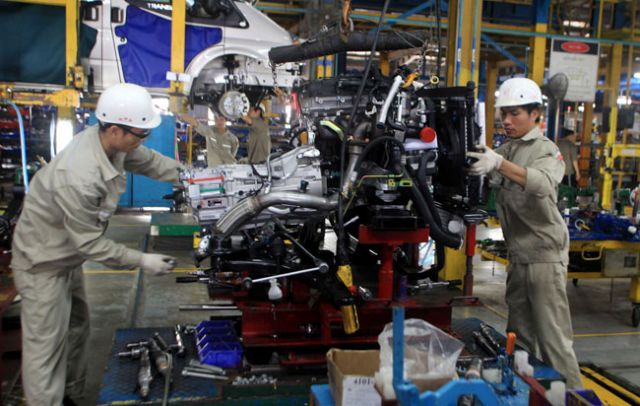Some UPCOM-listed companies are enjoying stable earnings brought by joint ventures they established with foreign partners, but their core businesses remain insignificant.

Some UPCOM-listed companies are enjoying stable earnings brought by joint ventures they established with foreign partners, but their core businesses remain insignificant.
These joint ventures are usually foreign direct investment (FDI) projects in which State-owned enterprises contribute capital and land use rights, while foreign companies contribute money and technology.
The Viet Nam Engine and Agricultural Machinery Corporation (VEAM), which makes engines, agricultural machinery, automobiles and motorbikes, possesses major stakes in three joint ventures, namely Honda Viet Nam (30 per cent), Toyota Viet Nam (20 per cent) and Ford Viet Nam (25 per cent).
VEAM's profits mainly come from these three joint ventures.
The firm's plentiful revenue from financial activities was also thanks to the dividends collected from its joint ventures.
The 2018 financial statements showed net revenue from the main business activities of VEAM reached VND7.07 trillion (US$304.2 million), but the company achieved VND7.04 trillion in post-tax profit.
In 2019, VEAM achieved revenue of VND685 billion and suffered a loss of VND337 billion in its main business.
But thanks to the large volume of revenue from financial activities of VND7.8 trillion, at the end of the year, the company still achieved a post-tax profit of VND7.04 trillion.
When spare parts manufacturer PetroVietNam Machinery-Technology JSC (PVM) was a State-owned enterprise 25 years ago, it held 30 per cent each in joint ventures with Japanese partners Nippon Seiki, Showa and FCC, all specialising in manufacturing auto and motorcycle parts.
After equitisation, PVM now only holds 10 per cent capital in the joint venture with FCC, 10 per cent with Nippon Seiki and 8.45 per cent with Showa.
These all are leading enterprises in the spare parts industry, supplying spare parts for Honda, Yamaha, and Suzuki. These joint ventures earn trillions of dong of profits each year and produce profits up to VND80-100 billion for PVM every year.
In 2016, PVM earned more than VND100 billion of dividends and distributed profits collected from joint ventures. It earned nearly VND84 billion in 2017, VND80 billion in 2018 and VND81.3 billion in 2019.
PVM’s core businesses only helped it achieve profits of VND21 billion in 2019, VND15.7 billion in 2018 and VND27.8 billion in 2017.
Vietnam Forestry Corporation JSC (Vinafor or VIF) also enjoys earnings from joint ventures with Yamaha from Japan, Hong Leong Industry from Malaysia, Sojitz Corporation from Japan and JK Paper from India.
In 2018 and 2019, the profits Vinafor earned from these joint ventures accounted for about 90 per cent of its profit structure.
Binh Duong Production and Trading Goods Corporation (PRT) is the Vietnamese partner in the FDI joint venture FrieslandCampina Vietnam Co Ltd, familiar to consumers with brands like Dutch Lady, Friso, YoMost, Fristi and Completa.
The main profit of the company comes from FrieslandCampina. PRT achieved dividends and distributed profits from this joint venture of VND402.8 billion and VND539.2 billion in 2018 and 2019, respectively.
Waiting for restructuring
Shareholders of these companies are looking forward to restructuring.
PVM has many conveniently-located land plots such as a 2,000sq.m land plot at Trang Thi Street, Hoan Kiem District in Ha Noi; 23,600sq.m in Dong Anh District, Ha Noi; 137sq.m in Thanh Xuan District, Ha Noi; and 1,500sq.m at 25 Mong Cai Street in Quang Ninh City.
However, earning results from the main businesses remain poor. At general meetings of shareholders every year, shareholders question leaders about the use of those land plots and request company restructuring, streamlining apparatus and increasing business efficiency.
At this year's meeting, PVM shareholders questioned the efficiency of the Centre of International Labour Co-operation and Service.
This centre reported revenue of VND790 million in 2019, only 13 per cent of the yearly goal.
The shareholders even suggested PVM's leaders consider dissolving the centre.
The cumbersome apparatus, ineffective operation of many departments and divisions, consume two-thirds of the dividends collected from the company’s joint ventures every year, the shareholders said.
Similarly, at the Annual General Meeting of Shareholders of Vinafor, shareholders complained that three years after equitisation, Vinafor's profits still rely largely on joint ventures.
Shareholders requested the company improve the efficiency of the afforestation and wood processing segments to improve the profit structure and avoid relying too much on dividends from the joint venture. — VNS





